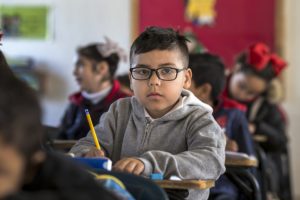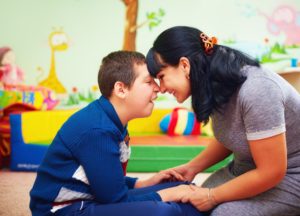Learning Disability Wales and the Engage to Change project have responded to Welsh Government’s consultations on changes to the Curriculum for Wales.
 In July we held a focus group with participants who were parents and carers as well as participants who worked in school settings. We responded to the consultation in order to give feedback on how best to measure children’s progression, and how to make sure children with learning disabilities have the best chances from the beginning. We also gave information on the specific areas of Sex and Relationship Education and on Careers and Work Related Experience. Here are our main points:
In July we held a focus group with participants who were parents and carers as well as participants who worked in school settings. We responded to the consultation in order to give feedback on how best to measure children’s progression, and how to make sure children with learning disabilities have the best chances from the beginning. We also gave information on the specific areas of Sex and Relationship Education and on Careers and Work Related Experience. Here are our main points:
Rethinking “additional” learning needs
For children and young people with learning disabilities and neurodivergences (e.g. dyslexia, autism, ADHD) school can be an alienating and scary experience. Being confronted with expectations that are based on the development of neorotypical children can mean that children whose brain works differently can feel that they are constantly failing and not living up to expectations.
We know that almost a quarter of children and young people in Welsh schools have been diagnosed with an additional learning need. It is important to point out that these were only the children who had known additional learning needs. While we cannot know how many people are neurodivergent we know that a significant number of children go through school with undiagnosed learning disabilities, learning difficulties and neurodivergences.

We believe that because of this, schools should put a much stronger focus on how understanding of disability issues informs teaching. This might, for example, include a more critical use of the concept of “additional learning needs” and an endorsement of the social model of disability. The term “additional learning needs” implies that there are “normal” learning needs and that everyone who struggles with the way things are being taught needs “additional” help. Rather, we believe it makes sense to understand learning needs as something individual and develop a way of learning in which everyone’s needs are met.
What does progression mean?
When we talk about how learners learn it’s important to understand that learners might not just progress at different paces, but also progress differently. We believe that a more flexible approach to progression would mean not just accepting that learners might progress at different speeds but also that progression might look different for individual learners. School should nurture the different capabilities and strengths that learners have and make sure students feel empowered by their learning experiences, instead of feeling disempowered by being measured against criteria that are unsuitable to them.
Being inclusive towards learners with learning disabilities and neurodivergent learners means working out how their skills and potential can best be developed on an individual, person-centred basis. This might include progression along pre-selected criteria like in this code, but it also may mean people developing in different and unexpected ways.
Developing a rights-based approach
People with learning disabilities are often not adequately informed about their rights. Schools should employ rights-based approaches to learning which centre on their right to learn according to their own needs and preferences.
It is important that teachers have a good understanding of the Equalities Act as well as the UN Convention on the Rights of the Child (PDF). This should also include learners knowing about their rights and being encouraged to advocate for themselves as well as others. People with a learning disability often do not get to have control over their own lives and decisions. School should encourage advocacy about learners’ own rights as well as caring for others.
On a related note, learners should be empowered to advocate for their own education to be accessible to them. They should be taught about their educational rights and the Equalities Act. We would like to see an acknowledgement of the learner’s right to equal access in this code.
It is also important to acknowledge the role that discrimination might play here. Learners might be facing interlocking and complicated systems of disadvantage and discrimination. Every curriculum should include commitments to making schools free from discrimination of all kinds. Schools should also commit themselves to engaging with children and families from hard-to-reach communities. This, for example, means reaching out to communities and building connections. It also means working against bullying and prejudice within schools, both in terms of how it manifests in behaviour from other students and teachers.
Communication
We would like to emphasise that disabled children may have different communication needs which need to be met. Learners should be encouraged to explore different forms of communication so they can find the forms that work best for them. This should be reflected in the guidance in that proficiency at language can mean different things for different people.
Material circumstances
It is important to have a good curriculum for a school. But it is just as important to make sure schools are adequately funded to be able to fully implement the curriculum. In our focus group our participants told us that the biggest concern they had was whether schools actually had the material resources to make the changes that needed doing.
Part of this is also the training of teachers. All teachers and teaching staff in schools need far more extensive training on disability and neurodiversity than they receive now. The training itself should be looked at to make sure that it is rights-based training that teaches about the social model of disability and encourages teachers to make an inclusive learning environment the default, not something “additional.”
 It is also important that teacher training itself becomes more inclusive. Teachers need to experience an inclusive environment themselves to be able to create one for others. Furthermore, having more disabled and neurodivergent teachers will also create a more inclusive environment for learners.
It is also important that teacher training itself becomes more inclusive. Teachers need to experience an inclusive environment themselves to be able to create one for others. Furthermore, having more disabled and neurodivergent teachers will also create a more inclusive environment for learners.
Similar to the widening funding issues, it is of vital importance that there are sufficient staff to be able to implement the curriculum. It is also important that there is consistency in teaching and support staff. Children with learning disabilities and neurodivergent children need consistency in their relationships and it is important that teaching assistants and other support staff are offered good working conditions.
Preparing for the world of work
The curriculum for Wales is clear that it should apply to all children, including those with additional learning needs. However, throughout this document it is not clear how it applies to disabled children. Only 6% of people with learning disabilities in the UK are in paid employment. Yet, we know from people with learning disabilities themselves that the vast majority of them want to work.
In their 2021 Manifesto All Wales People First write that: “It is important that employers in Wales create opportunities for people with learning disabilities. Many people with learning disabilities have succeeded in the workforce when reasonable adjustments have been made, such as easy read information in adverts and interviews, support to learn a job and paid internships.”
Schools are an important institution in enabling learners with learning disabilities to develop their aspirations and skills. Too often young people with learning disabilities are made to feel from an early age that they are less than others, that they deserve less and can achieve less than other children. To rectify this disability issues have to be integrated into the teaching. One problem with this guidance is that it does not explicitly do that.
People with learning disabilities have the right to participate fully in society and that includes being given work related training and career experiences. The guidance should reflect that and obligate schools to give disabled children equal access to these opportunities.
From our focus groups we know that often the opportunities offered to learners with learning disabilities and neurodiverse learners are very limited. These learners have the right to experience different workplaces and decide what area of work is right for them. This means that schools working with disabled learners must do more to offer them suitable and diverse work experiences. Providing suitable support for them to find work placement and to learn on the job is necessary to enable this. This is usually the support of a trained Job Coach.
It is important that children and young people are taught about the social model of disability and about the way that the social model applies to the workplace. It is also important that children and young people are not only prepared for the world of work but also that they have the right to reasonable adjustments to ensure jobs are made to fit them. Schools should be working with employers, Careers Wales and other organisations to facilitate learning on all sides.
Offering learners the right opportunities
In the Learning Disability Wales focus group we heard that some families with children with additional learning needs face a postcode lottery when it comes to accessing work related experience. We also heard that funding for opportunities is also not consistent over time with programmes that offer young people opportunities to experience the workplace.
In keeping with the social model of disability it is also important to point out that one key reason that people with a learning disability struggle to gain or maintain employment is that employers do not offer the right reasonable adjustments. Schools should work with employers during work experiences to give person centred support to their students.
We also urge decision makers to look specifically into supported employment and how it can be integrated into the curriculum to make sure that young people with learning disabilities get a fair shot. Supported employment agencies can offer specialist support to find, get, and learn in the work placement that can make sure learners have a positive first experience within the world of work that will set them up for the future.
In the context of the Curriculum for Wales we also suggest Careers Wales explores closer cooperation with NHS Wales in order to provide meaningful work experience placements for pupils with additional learning needs. (More information on what such partnerships could look like can be found in our position paper: How can public sector employers like the NHS help people with a learning disability or autism get jobs?)
Relationship and Sexual Education
Relationship and Sexual Education should be a whole-school approach and inclusive to all. The principle that learners should learn “to value difference, and diversity as a source of strength” is very important as too often disabled children, including those with a learning disability, are seen as having a weakness instead of being celebrated for their strengths and what they can offer to others.
Learning Disability Wales believes that much more information and guidance should be provided to practitioners about why it is the important to teach Relationship and Sexual Education to children with additional learning needs – e.g. they can be dependent on others for personal care. This can make them vulnerable to abuse as they may not be aware that what is happening to them is wrong, or may have difficulty in communicating or expressing concerns about what is happening to them. It is therefore important the difference between appropriate and inappropriate touch is taught.
Being sensitive to trauma
Discussion in Relationship and Sexual Education could set off issues for any child or young people who has experienced abuse. It is therefore important that all Relationship and Sexual Education training includes advice to practitioners on how to deal with this. Some children and young people may disclose abuse for the first time during or after these lessons, so again appropriate advice for practitioners – such as reporting it to your safeguarding lead, do not ask leading question, etc – need to be included.
One practitioner in our focus group noted that: “Relationship and Sexual Education [should be regarded as] a safeguarding issue. There are many papers and reports about the facts: People with learning disabilities are three to four times more likely to be abused (including sexually). The guidance should include a focus on prevention of abuse, and awareness of the body and consent. I disagree that we need lots of experts, what we need is adults and peers to be able to talk about the issues openly as and when needed. Most people with learning disabilities do not receive any education about sexuality and relationships and this is staggering.”
How to find the full consultation responses
You can read our original responses to the Welsh Government Consultations here: (all documents open as English language PDFs)
- Curriculum for Wales – Draft Progression Code (PDF)
- Enabling Pathways (PDF)
- Relationships and sexuality education (RSE) statutory guidance and code (PDF)
- Curriculum for Wales Guidance: Careers and Work-Related Experiences (CWRE) (PDF)
We would like to thank the participants from our focus group which included participants from Travelling Ahead TGP Cymru, Bridgend County Borough Council, Pembrokeshire Association of Voluntary Services (PAVS), and University of Wales Trinity St David, as well as thank Cardiff People First for submitting written evidence.



 >
>
 >
>
